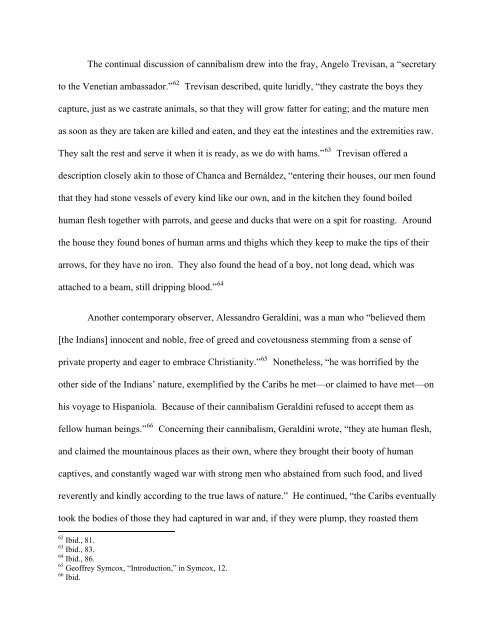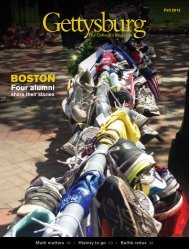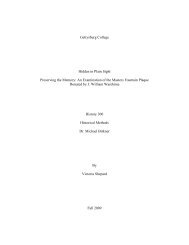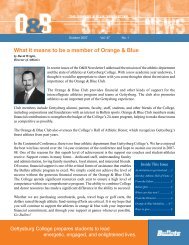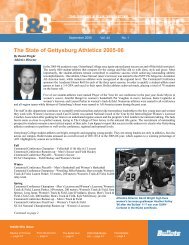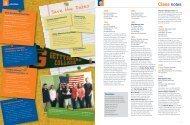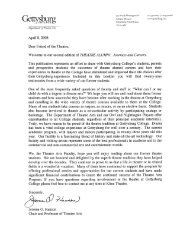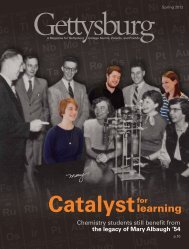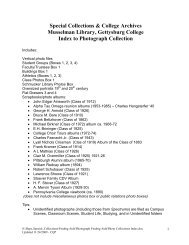Sweet Tooth for Empire: Sugar and the British Atlantic World
Sweet Tooth for Empire: Sugar and the British Atlantic World
Sweet Tooth for Empire: Sugar and the British Atlantic World
You also want an ePaper? Increase the reach of your titles
YUMPU automatically turns print PDFs into web optimized ePapers that Google loves.
The continual discussion of cannibalism drew into <strong>the</strong> fray, Angelo Trevisan, a “secretary<br />
to <strong>the</strong> Venetian ambassador.” 62 Trevisan described, quite luridly, “<strong>the</strong>y castrate <strong>the</strong> boys <strong>the</strong>y<br />
capture, just as we castrate animals, so that <strong>the</strong>y will grow fatter <strong>for</strong> eating; <strong>and</strong> <strong>the</strong> mature men<br />
as soon as <strong>the</strong>y are taken are killed <strong>and</strong> eaten, <strong>and</strong> <strong>the</strong>y eat <strong>the</strong> intestines <strong>and</strong> <strong>the</strong> extremities raw.<br />
They salt <strong>the</strong> rest <strong>and</strong> serve it when it is ready, as we do with hams.” 63 Trevisan offered a<br />
description closely akin to those of Chanca <strong>and</strong> Bernáldez, “entering <strong>the</strong>ir houses, our men found<br />
that <strong>the</strong>y had stone vessels of every kind like our own, <strong>and</strong> in <strong>the</strong> kitchen <strong>the</strong>y found boiled<br />
human flesh toge<strong>the</strong>r with parrots, <strong>and</strong> geese <strong>and</strong> ducks that were on a spit <strong>for</strong> roasting. Around<br />
<strong>the</strong> house <strong>the</strong>y found bones of human arms <strong>and</strong> thighs which <strong>the</strong>y keep to make <strong>the</strong> tips of <strong>the</strong>ir<br />
arrows, <strong>for</strong> <strong>the</strong>y have no iron. They also found <strong>the</strong> head of a boy, not long dead, which was<br />
attached to a beam, still dripping blood.” 64<br />
Ano<strong>the</strong>r contemporary observer, Aless<strong>and</strong>ro Geraldini, was a man who “believed <strong>the</strong>m<br />
[<strong>the</strong> Indians] innocent <strong>and</strong> noble, free of greed <strong>and</strong> covetousness stemming from a sense of<br />
private property <strong>and</strong> eager to embrace Christianity.” 65 None<strong>the</strong>less, “he was horrified by <strong>the</strong><br />
o<strong>the</strong>r side of <strong>the</strong> Indians’ nature, exemplified by <strong>the</strong> Caribs he met—or claimed to have met—on<br />
his voyage to Hispaniola. Because of <strong>the</strong>ir cannibalism Geraldini refused to accept <strong>the</strong>m as<br />
fellow human beings.” 66 Concerning <strong>the</strong>ir cannibalism, Geraldini wrote, “<strong>the</strong>y ate human flesh,<br />
<strong>and</strong> claimed <strong>the</strong> mountainous places as <strong>the</strong>ir own, where <strong>the</strong>y brought <strong>the</strong>ir booty of human<br />
captives, <strong>and</strong> constantly waged war with strong men who abstained from such food, <strong>and</strong> lived<br />
reverently <strong>and</strong> kindly according to <strong>the</strong> true laws of nature.” He continued, “<strong>the</strong> Caribs eventually<br />
took <strong>the</strong> bodies of those <strong>the</strong>y had captured in war <strong>and</strong>, if <strong>the</strong>y were plump, <strong>the</strong>y roasted <strong>the</strong>m<br />
62 Ibid., 81.<br />
63 Ibid., 83.<br />
64 Ibid., 86.<br />
65 Geoffrey Symcox, “Introduction,” in Symcox, 12.<br />
66 Ibid.


